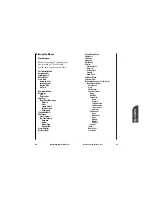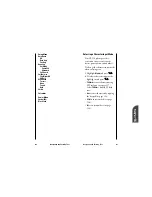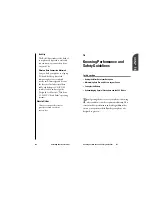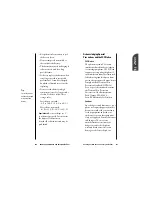
Knowing Performance and Safety Guidelines
143
16
Performance
and Safety
142
Knowing Performance and Safety Guidelines
Acknowledging Special
Precautions and the FCC Notice
FCC Notice
The phone may cause TV or radio
interference if used in close proximity
to receiving equipment. The FCC can
require you to stop using the phone if
such interference cannot be eliminated.
Vehicles using liquefied petroleum
gas (such as propane or butane) must
comply with the National Fire
Protection Standard (NFPA-58).
For a copy of this standard, contact
the National Fire Protection
Association, One Batterymarch
Park, Quincy, MA 02269,
Attn: Publication Sales Division.
Cautions
Any changes or modifications to your
phone not expressly approved in this
document could void your warranty
for this equipment and void your
authority to operate this equipment.
Only use approved batteries, antennas
and chargers. The use of any
unauthorized accessories may be
dangerous and voids the phone
warranty if said accessories cause
damage or a defect to the phone.
•
Keep the metal contacts on top of
the battery clean.
•
Don’t attempt to disassemble or
short-circuit the battery.
•
The battery may need recharging if
it has not been used for a long
period of time.
•
It’s best to replace the battery when
it no longer provides acceptable
performance. It can be recharged
hundreds of times before it needs
replacing.
•
Don’t store the battery in high
temperature areas for long periods
of time. It’s best to follow these
storage rules:
Less than one month:
-4º F to 140º F (-20º C to 60º C)
More than one month:
-4º F to 113º F (-20º C to 45º C)
Special note:
Be sure to dispose of
your battery properly. In some areas,
the disposal of batteries in
household or business trash may be
prohibited.
Tip:
For safety, do not
handle a damaged
or leaking Lilon
battery.
Содержание SP 510
Страница 1: ...SP 510 Phone User Guide ...




































